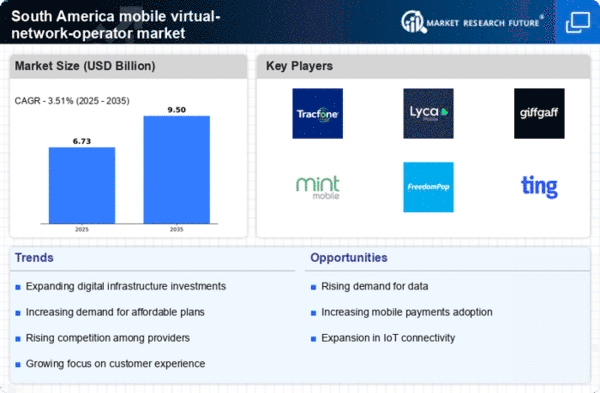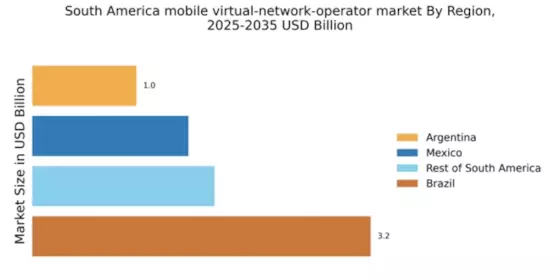Evolving Consumer Preferences
Consumer preferences in South America are evolving, significantly impacting the mobile virtual-network-operator market. Users are increasingly seeking flexible and customizable mobile plans that align with their specific needs. This shift is evident as consumers prioritize value for money, leading to a growing demand for no-contract and pay-as-you-go options. As of 2025, it is estimated that around 60% of mobile users in the region prefer such plans, indicating a substantial market opportunity for virtual operators. This trend suggests that traditional operators may need to adapt their offerings to remain competitive. The ability of mobile virtual-network-operators to provide tailored solutions that resonate with consumer preferences could potentially enhance their market share and foster customer loyalty.
Competitive Pricing Strategies
Competitive pricing strategies are emerging as a significant driver in the mobile virtual-network-operator market in South America. As the market becomes saturated with various service providers, operators are compelled to adopt aggressive pricing models to attract and retain customers. This trend is particularly evident in urban areas, where consumers have access to multiple options. By offering lower rates and innovative pricing structures, mobile virtual-network-operators can differentiate themselves from traditional carriers. As of 2025, it is estimated that virtual operators are able to offer plans that are 20-30% cheaper than those of traditional providers. This pricing advantage not only appeals to cost-conscious consumers but also encourages greater market penetration, potentially leading to increased subscriber growth for virtual operators.
Increasing Smartphone Penetration
Growth is due to the increasing penetration of smartphones. As of 2025, smartphone adoption in the region has reached approximately 80%, facilitating access to mobile services. This trend indicates a shift in consumer behavior, where users are more inclined to seek affordable mobile plans offered by virtual operators. The proliferation of smartphones enables users to utilize data-intensive applications, thereby increasing demand for mobile data services. Consequently, mobile virtual-network-operators are positioned to capitalize on this trend by providing tailored services that cater to the needs of a tech-savvy population. The rise in smartphone usage is likely to drive competition among operators, leading to innovative service offerings and pricing strategies that could further enhance market growth.
Expansion of Internet Connectivity
The expansion of internet connectivity in South America is a crucial driver for the mobile virtual-network-operator market. With ongoing investments in infrastructure, internet penetration has improved significantly, reaching approximately 70% in urban areas by 2025. This enhanced connectivity facilitates the growth of mobile data services, as users increasingly rely on the internet for communication and entertainment. Mobile virtual-network-operators are well-positioned to leverage this trend by offering competitive data packages that cater to the growing demand for online services. The increased availability of high-speed internet is likely to attract more users to virtual operators, thereby contributing to the overall growth of the market. As connectivity continues to expand, the potential for mobile virtual-network-operators to capture a larger customer base becomes increasingly viable.
Regulatory Changes Favoring Innovation
Regulatory changes in South America are fostering an environment conducive to innovation within the mobile virtual-network-operator market. Governments are increasingly recognizing the importance of competition in the telecommunications sector, leading to policies that support the entry of new players. These regulatory frameworks aim to reduce barriers to entry, allowing mobile virtual-network-operators to thrive. As of 2025, several countries in the region have implemented measures to streamline licensing processes and promote fair competition. This regulatory support is likely to encourage investment in new technologies and service models, further enhancing the capabilities of mobile virtual-network-operators. The evolving regulatory landscape appears to be a catalyst for growth, enabling operators to introduce innovative solutions that meet the diverse needs of consumers.

















